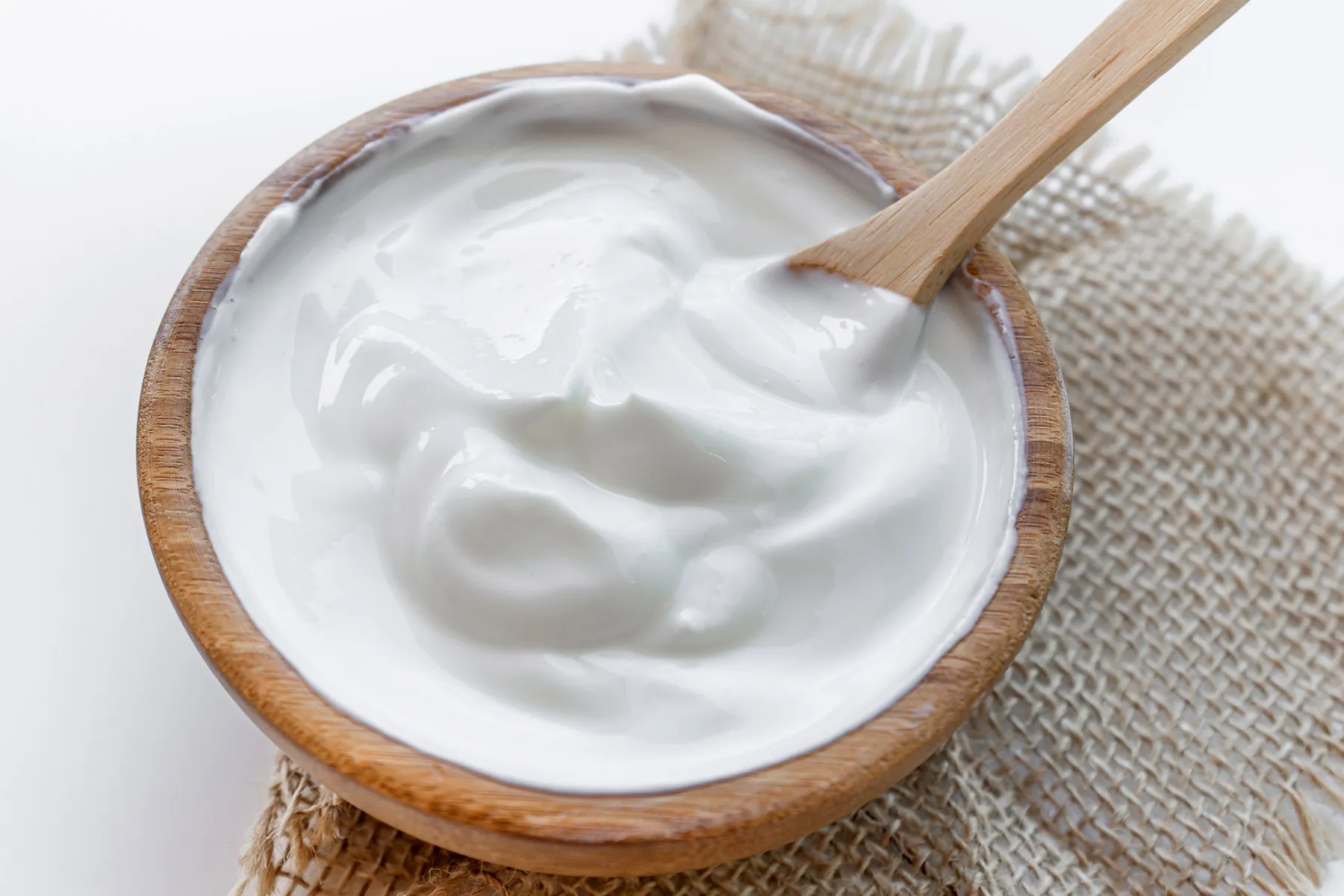Yogurt is packed with nutrients that can help lower the risk of heart disease and osteoporosis, and also support weight control.
Yogurt is a beloved dairy product produced by fermenting milk with specific bacteria.
The microbes used to produce yogurt are known as “yogurt cultures,” which ferment lactose, the natural sugar present in milk. This fermentation yields lactic acid, a compound that causes milk proteins to coagulate, creating yogurt’s characteristic taste and consistency.
Yogurt can be prepared from the milk of various animals. Versions made from skim milk are considered fat-free, while those from whole milk are classified as full-fat.
Plain, uncolored yogurt is a thick, white food with a tangy taste. Yet, many commercial products include additional ingredients like sugar and artificial flavors.
Below are six health benefits of natural yogurt supported by scientific evidence.
1. Packed with essential nutrients
Yogurt contains nearly every nutrient your body requires.
Notably, it’s a rich source of calcium, a mineral vital for strong teeth and bones. One cup (245 grams [g]) of low-fat, plain yogurt supplies a substantial portion of your daily calcium requirement.
It’s also a good source of B vitamins, especially riboflavin (B2) and B12, which may protect against cardiovascular disease and certain neural tube defects in newborns.
One cup additionally supplies:
- Phosphorus: 28% of Daily Value (DV)
- Potassium: 12% of DV
- Magnesium: 10% of DV
Yogurt doesn’t naturally provide vitamin D, but it’s often fortified with it. Vitamin D supports bone and immune health and may lower the risk of conditions such as heart disease and depression.
2. High in protein
Yogurt is a rich protein source, with 1 cup (245 g) delivering a significant amount.
Protein is one of the three macronutrients needed in relatively large quantities to sustain bodily functions. Research indicates protein may be important for:
- controlling appetite
- building muscle mass and strength
- increasing resting metabolic rate
- assisting with weight loss and weight maintenance
- aiding wound repair and muscle recovery
- improving bone density
If you want more protein, try Greek yogurt — a strained, thicker type that has higher protein content than standard yogurt, offering nearly a full serving per 7 ounces (200 g).
»More on this:What are the benefits of protein?3. Certain types may support gut health
Some yogurts contain live bacteria, or probiotics, either from the starter culture or added after pasteurization. Common probiotic strains in yogurt include Bifidobacteria and Lactobacillus.
Eating probiotic-rich yogurt can support digestive health in multiple ways, such as:
- easing digestive symptoms like diarrhea, bloating, constipation, and gas
- helping manage chronic intestinal conditions such as Crohn’s disease and ulcerative colitis
- supporting immune function
- helping regulate cholesterol levels
- potentially reducing some cancer risks
When selecting yogurt, read the label for live and active cultures. Many products undergo pasteurization, a heat process that can kill beneficial bacteria.

4. May enhance immune function
Regular consumption of yogurt, particularly varieties containing probiotics, may strengthen the immune system and lower the chance of infections.
For example, some studies indicate probiotics might decrease the incidence, length, or severity of:
- common cold
- rotavirus
- influenza (flu)
- COVID-19
- gastroenteritis
Probiotics can reduce inflammation, which is implicated in numerous health issues from viral infections to gastrointestinal disorders.
Yogurt’s immune-supporting effects also stem from trace minerals such as zinc, selenium, and iodine, which play roles in immune health.
Yogurt fortified with vitamin D may further support immunity by helping to prevent illnesses like colds and flu.
5. May support cardiovascular health
Yogurt’s fat composition makes its role in a healthy diet a subject of debate. It contains mainly saturated fat, with smaller amounts of monounsaturated fatty acids.
For many years, the American Heart Association (AHA) has advised limiting saturated fat because of its potential link to heart disease.
However, a 2020 review showed the connection between saturated fat and heart disease is complex, and not all evidence supports a direct association.
Still, low-fat and fat-free yogurts remain common choices in the United States.
When evaluating saturated fat’s health impact, it’s crucial to consider its source and which fats replace it. Saturated fats from whole dairy products like yogurt likely affect health differently than saturated fats from heavily processed fast foods.
Indeed, studies suggest saturated fats from dairy may raise HDL (good) cholesterol, lower blood pressure, and possibly protect against diabetes and heart disease, though additional research is required.
6. May aid weight control
Greek yogurt in particular offers traits that can help with weight management.
First, it’s rich in protein, which helps raise levels of appetite-suppressing hormones such as peptide YY and GLP-1.
Additionally, a 2015 review showed yogurt intake is linked to lower body weight, reduced body fat percentage, and smaller waist circumference. Full-fat dairy products may even decrease obesity risk, challenging earlier assumptions about full-fat dairy and weight gain.
Other research has found yogurt consumers generally have healthier overall diets than non-consumers, partly because yogurt is nutrient-dense while relatively low in calories.
How to pick the healthiest yogurt
Plain, unsweetened yogurts are typically the healthiest choice.
Many yogurts contain high levels of added sugars, especially those marketed as low-fat. Excess sugar intake is linked to numerous health issues, including diabetes, obesity, and dental cavities.
Always check ingredient labels for added sugars.
Choosing low-fat versus full-fat yogurt depends on personal preference. Full-fat varieties may have more calories but are nutrient-rich and often more satisfying in flavor and satiety.
Also seek yogurts labeled as containing live and active cultures to ensure probiotic benefits.
If you have lactose intolerance or a milk allergy, you may need to limit or avoid yogurt because it could provoke symptoms.
»More on this:How to choose the best yogurtFrequently asked questions
Is it okay to eat yogurt daily?
Yes — including yogurt daily can be part of a balanced, healthy diet because it supplies important nutrients like protein, calcium, magnesium, and phosphorus.
When is the ideal time to eat yogurt?
Yogurt works well at any time of day and can be included with meals or as a snack to help keep you feeling full. It’s a common breakfast or snack option.
Can yogurt help with acid reflux?
Yes, some evidence suggests that non-acidic yogurt may ease acid reflux due to its probiotic content and may help soothe stomach discomfort.
Is yogurt beneficial for gastritis?
Yes, yogurt may be helpful for gastritis because probiotics in yogurt could reduce gastrointestinal inflammation and support a healthy gut microbiome.
The bottom line
Yogurt is nutrient-rich and can improve health when included regularly in your diet. It may lower the risk of certain diseases while supporting digestive health and weight control.
To get the most benefit, pick plain, unsweetened varieties that contain probiotics.

























Leave a Reply
You must be logged in to post a comment.